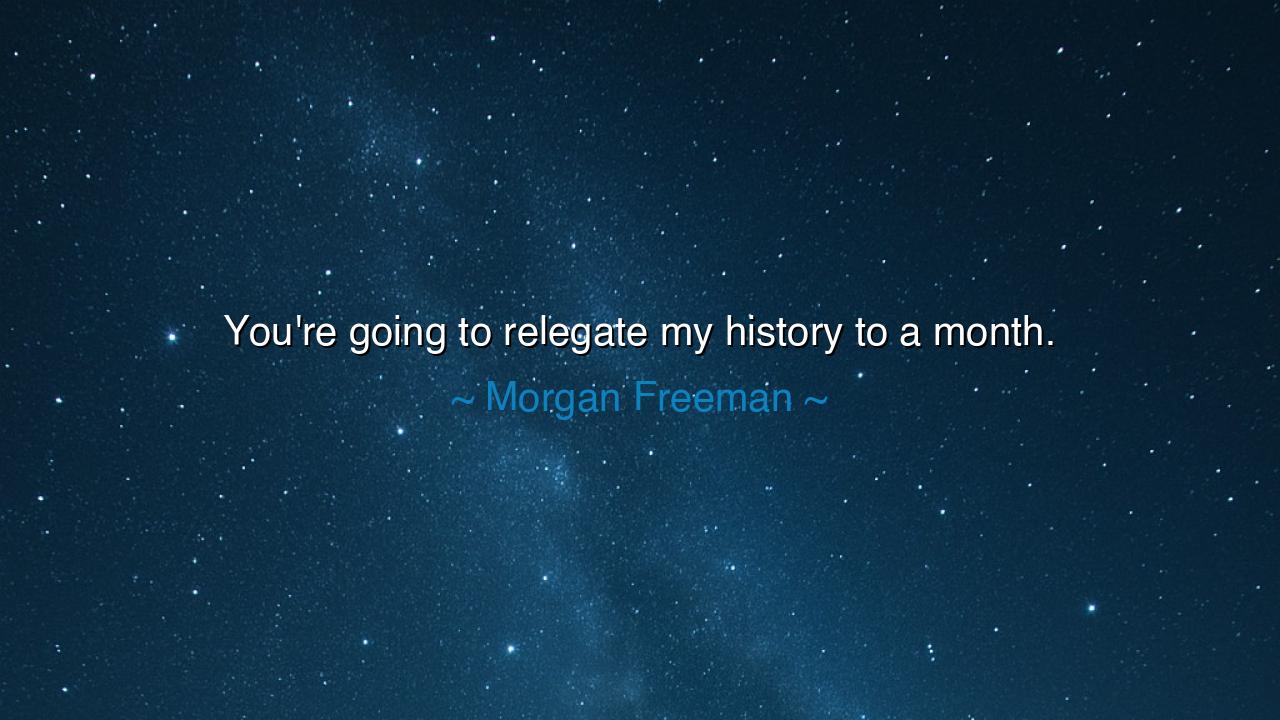
You're going to relegate my history to a month.






In the steady, resonant voice of a man whose words carry both the gravity of wisdom and the ache of truth, Morgan Freeman once said: “You’re going to relegate my history to a month.” Though short, this statement cuts deeper than any lecture or speech. It is a question, a rebuke, and a lament—a call for recognition not confined to ritual, but lived as reality. Freeman, known not only as one of the great actors of his time but also as a thinker and a son of history, was not rejecting Black History Month itself. Rather, he was challenging the notion that the vast, eternal story of a people—born of endurance, genius, and sacrifice—could ever be compressed into thirty fleeting days of remembrance. His words remind us that history, if it is to live, must dwell not on calendars, but in conscience.
To understand the origin of this quote, we return to a 2005 interview with journalist Mike Wallace on 60 Minutes. When asked about Black History Month, Freeman responded with composed defiance: “I don’t want a Black History Month. Black history is American history.” In that single exchange, he articulated a truth that transcends borders and centuries—the truth that the contributions of African Americans are not side notes to the human story, but integral to it. His objection was not born of pride alone, but of a philosopher’s understanding: that to isolate one people’s heritage to a “special month” is to subtly suggest it exists apart from the whole, rather than within it. Freeman’s question, “You’re going to relegate my history to a month?” is a challenge to the world’s habit of remembering too little, too late.
The meaning of his words reaches far beyond the boundaries of America. Throughout time, societies have tried to confine uncomfortable truths to ceremonial spaces—days of mourning for atrocities, weeks of remembrance for injustice, months of token honor for the oppressed. Yet what Freeman reminds us is that remembrance without integration is a shadow without substance. The legacy of Black history—of slavery, resistance, invention, art, and triumph—is not an appendage to civilization; it is civilization itself. It flows through the veins of nations: through the rhythm of their music, the architecture of their economies, and the conscience of their democracies. To relegate it to a month is to place eternity in a box.
Consider the story of Carter G. Woodson, the scholar who first proposed Negro History Week in 1926, the precursor to Black History Month. His intention was never confinement—it was liberation. In a time when schools erased the contributions of African Americans, Woodson sought to restore visibility and dignity. But he also hoped that one day such a special week would no longer be necessary, because the history of his people would be fully woven into the fabric of education and public life. Morgan Freeman’s words echo that original vision. What Woodson began as a tool of inclusion, Freeman warns against allowing to become a boundary. He reminds us that the ultimate goal of remembrance is not periodic recognition—it is permanent awareness.
The ancients knew well that memory is the foundation of virtue. The Greeks told of Mnemosyne, the goddess of memory, who gave birth to the Muses—the keepers of art, poetry, and knowledge. Without memory, there is no identity; without identity, there can be no progress. Freeman’s challenge is thus both moral and civilizational: he asks whether we are truly remembering, or merely performing remembrance. For to honor the ancestors in truth is not to name a month after them, but to live their legacy—to teach their contributions in every classroom, to reflect their courage in every struggle for justice, and to see their humanity as indistinguishable from our own.
Freeman’s question is also a mirror to the human condition. It asks each of us: what histories have we neglected? What stories have we confined to the corners of comfort? Too often, societies seek to contain the pain of the past in rituals of convenience, rather than facing it as part of their own soul. Yet healing cannot come from separation; it comes from integration. Just as the American story is incomplete without Black history, so too is the story of humanity incomplete without every culture, every struggle, every triumph that has brought us to this moment. Freeman’s rebuke calls us to rise above selective remembrance and embrace a vision of shared history—a history that belongs to all, told by all, honored by all.
So let this be the lesson, O listener of truth: do not relegate what is sacred to a season. Let the memory of the enslaved, the inventors, the poets, and the dreamers dwell not in February alone, but in the living rhythm of each day. Learn to see history not as division but as inheritance. Speak not of “their” story, but of ours. For when we recognize that every triumph of one group enriches the destiny of all, we fulfill the deepest purpose of remembrance: not to separate, but to unite. As Morgan Freeman reminds us, history is not an occasion—it is the essence of our humanity. And it demands not thirty days of honor, but a lifetime of understanding.






AAdministratorAdministrator
Welcome, honored guests. Please leave a comment, we will respond soon